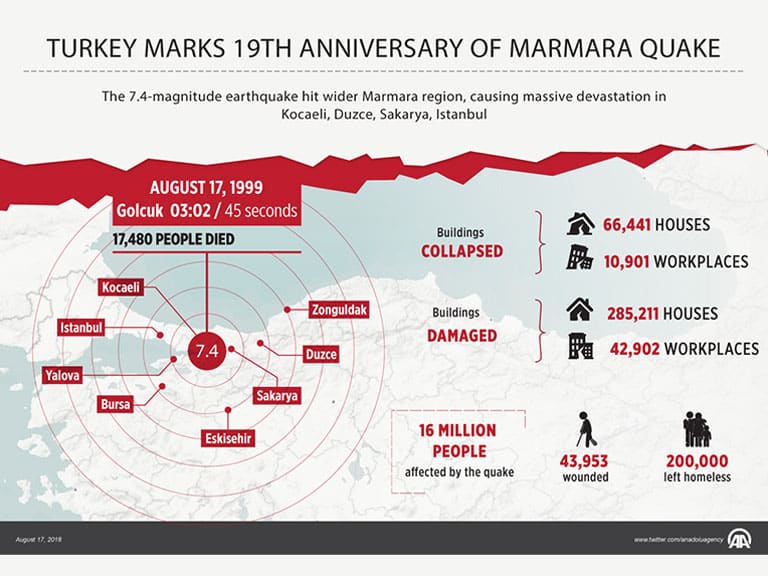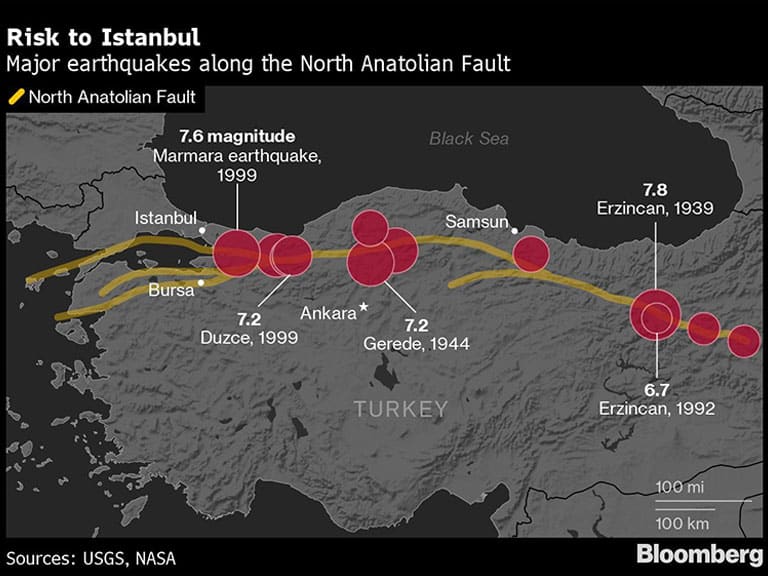Well, you should. Turkey sits on various fault lines that run west to east and north to south of the country. However, that doesn’t mean you should be worried. Big cities like Istanbul are undergoing a re-planning phase to bring buildings up to their new earthquake codes and regulations. Additionally, there haven’t been any recent earthquakes in popular coastal areas such as Izmir, Ephesus, Bodrum, and Pamukkale.
In Cappadocia, there aren’t any earthquakes at all. So, while there’s no need to cancel your travel plans, you should probably still read the rest of this article. Just to be prepared.

A Timeline of Major Earthquakes in Turkey
To give you a better idea of the earthquakes in Turkey, here’s a quick timeline of the worst throughout history:
- December 26, 1939: An earthquake with a magnitude of 7.2 kills 32.700 people in the city of Erzincan.
- December 20, 1942: A 7.3 magnitude earthquake strikes the Erbaa-Niksar area, destroying around 5000 buildings and killing 1,100 people.
- November 26, 1943: The Ladik-Vezirkopru area is hit with a 7.6 magnitude earthquake, killing 4000 people and destroying up to 75 percent of the housing.
- February 1, 1944: A 7.4 magnitude earthquake kills 2790 people along the North Anatolian Fault Zone (from Bolu to Kersnu). At least 50.000 homes were destroyed.
- May 31, 1946: An earthquake of 5.9 magnitude kills 1300 people in Ustruken.
- March 18, 1953: The Can-Yenice-Gonen area experiences a 7.3 magnitude earthquake, killing roughly 1070 people. The quake was felt throughout the Aegean islands and Greece.
- August 19, 1966: 2529 people die during a 6.8 magnitude earthquake in the southeastern town of Varto.
- March 28, 1970: The western town of Gediz is hit with a 6.9 magnitude earthquake. 1086 people were killed, and 3000 were injured.
- May 22, 1971: South of Ankara, a 6.9 magnitude earthquake hits, nearly eradicating the city of Bingol. Over a thousand people lost their lives, and over 15.000 people lost their homes.
- September 6, 1975: Lice and its surrounding villages are torn apart by a 6.7 magnitude earthquake. About 2350 people were killed, and 3000 were injured.
- November 24, 1976: 5291 people were killed in Van Province during an earthquake of 7.3. It destroyed hundreds of villages.
- October 30, 1983: Northeast Erzurum is hit by a 6.9 magnitude earthquake, and up to 50 villages between there and Kars are ruined. 1340 people lost their lives, and about 530 were injured.
- August 17, 1999: A 7.6 magnitude earthquake strikes Izmit killing over 17.000 people and injuring another 50.000. This earthquake also did damage to Istanbul, Kocaeli, and Sakarya.
- October 23, 2011: Ercis and Van were hit by a 7.2 magnitude killing over 500 people—with hundreds more missing. It also injured 1650 people.
- February 6, 2023: Southeastern Turkey was hit by a massive 7.8-magnitude earthquake, regarded as the deadliest of the last 100 years. A second 7.6-magnitude earthquake struck on the same day within 12 hours. Kahramanmaras, Hatay, Osmaniye, Gaziantep, Sanliurfa, Malatya, Adiyaman, Diyarbakir, and Adana were the most affected cities.
Donate for Disasters in Turkey
Since this is all happening right now and is way more than what you see on the screens, you can help spread the word. If anyone would like to contribute, please visit https://ahbap.org/disasters-turkey now.
Ahbap is the most trusted NGO; we are also sure of their hard work in the field and that the support will be delivered safely to those in need.
Istanbul
The entire country of Turkey rests in the middle of several tectonic plates. The boundaries of these plates make for the most hazardous places, seismically speaking. Of course, these coordinates put the rest of the country within those boundaries at risk for damaging earthquakes, as you can see.

How Often Do Earthquakes Occur in Turkey?
Turkey is prone to earthquakes due to its location on various fault lines. In 2017 alone, Turkey experienced 26,290 earthquakes. Of course, they weren’t all measured at a devastating magnitude, like in the timeline above. A little over 18,000 of those earthquakes only have a magnitude of 2.0 or lower.
It was, however, the most seismic activity that the country had experienced in 15 years.
Certain regions experienced up to five daily earthquakes— varying sizes. Their magnitude was much higher in the Marmara and Aegean regions, where fault lines are more concentrated.
Speaking of magnitude, if you’re wondering, what do the values on the Richter scale express? It’s simply the amount of energy released by an earthquake. If the magnitude is measured at 2.0 or less, it’s considered a microquake, which humans cannot feel.
Anything between a 2.5 and a 5.4 magnitude is considered a tremor and is often felt and only causes minor damage beyond a 3.5. However, anything above a 5.5 will cause minor to severe damages—and felt.
An earthquake’s average length is typically between 10 and 30 seconds. However, the most recent earthquake to hit Turkey was reported to have lasted up to 40 seconds. With all of this in mind, it’s safe to say that earthquakes happen daily in Turkey; they’re just not always significant.
Staying Safe During Earthquakes in Turkey
If you happen to be in Turkey when a minor to significant earthquake strikes—or anywhere for that matter—here’s what to do before, during, and after:
Before an Earthquake:
Even if you’re traveling for a short time, you still want to be prepared for any potential earthquakes in Turkey. So, wherever you’re staying—and this goes for earthquakes everywhere—here’s the pre-earthquake checklist:
- Locate all forms of aid. This means a fire extinguisher, first aid kit, battery-powered radio, a flashlight, and extra batteries. If you can’t locate these items, ask the hotel staff, housekeeper, or owner (depending on where you’re staying).
- Know how to turn off the elements. If you’re staying in a hotel or an apartment building, they’ll have their emergency procedures. If you’re staying in a home, make sure you know how to turn off the gas, water, and electricity.
- Have first aid knowledge. Anything can happen during an earthquake, including minor to severe injuries. Make sure you know basic first aid concepts, as they can make all the difference between life and death.
- Have an earthquake plan. Be sure that everyone you’re traveling with is on the same page regarding what to do and where to meet after an earthquake.
- Anchor heavy objects. Of course, given Turkey’s frequent earthquakes, these things should already be done whether you’re staying in a hotel or renting a house or an apartment. While settling in, take a quick scan to see if heavy furniture and appliances are anchored to the walls or floor. Take note of any heavy objects on shelves etc.
As we mentioned, most places should have these things taken care of. However, it’s still up to you to take a minute to run through the checklist to prepare yourself.
During an Earthquake:
The most important thing to do during an earthquake is to stay calm—and protect your body from falling and/or flying objects. Here’s what to do in each earthquake situation:
- Don’t go outside. If you’re indoors, stay there. Try to take cover under a sturdy table if possible. If there are no tables, find a structurally sound point of the room, such as an interior wall, and stand up against it.
- Stay away from heavy furniture, windows, and hanging objects. When earthquakes hit, these things tend to go flying or shatter, and they could be the very thing that injures or kills you.
- Find a clear area. Get away from buildings, trees, power lines, and other structures if you’re outside. Find the most precise location you can and stay there.
- Pull Over. If you’re in a car, find a clear area away from trees and buildings to pull over. Stay in the car until the earthquake ends and check the radio for updates.
- Stay away from fire. Don’t light any matches, candles, lighters, or flames. You don’t know if there are any broken gas lines, and if you light a fire in the vicinity of one, it’s game over.
Many people believe doorways are the safest places to be during an earthquake. In Turkey, however, there are a tremendous amount of incompliant code buildings that act as a catalyst to the damage done by earthquakes. So, as far as earthquakes in Turkey go, exterior walls are not your friend.
After an Earthquake:
What you do after an earthquake is equally as important as what you do during, especially since you will feel panicked despite your best efforts to remain calm. So, take a few deep breathes and follow these steps:
- Check yourself for injuries. Once the earthquake subsides, you may be in shock or panic. Give yourself a once-over to make sure you’re not injured. Once you’re good, provide first aid to anyone needing it.
- Check all lines for damages. Check for any damaged or broken water, gas, and electric lines. Whether they’re damaged or not, turn them off. If you smell gas, open the windows and doors to air it out. Then, leave immediately and report it as soon as you can.
- Tune into the radio. Save your phone for emergencies and listen to the radio for updates and directions.
- Be careful of structures and debris. Everything is unstable after an earthquake, so stay out of buildings and away from waste and broken glass.
- Stay away from water. Earthquakes can lead to tsunamis and seiches, making lakes and the ocean dangerous.
- Expect aftershocks. The worst of the earthquake may be over, but tremors can follow, which are just as dangerous.
If you’re in an office building, a hotel, or another professional setting, you’ll be guided through specific protocols and procedures by the staff.
Should I Be Worried While Visiting Turkey?
Given that most earthquakes in Turkey are rarely felt, you shouldn’t be too worried during your visit. Instead, you should be more concerned about motor traffic, taxis without logos, and tap water rather than earthquakes!
Are you planning a trip to Turkey? We can help. Contact us today to learn about our private tours, things to do, places to see, and more.
